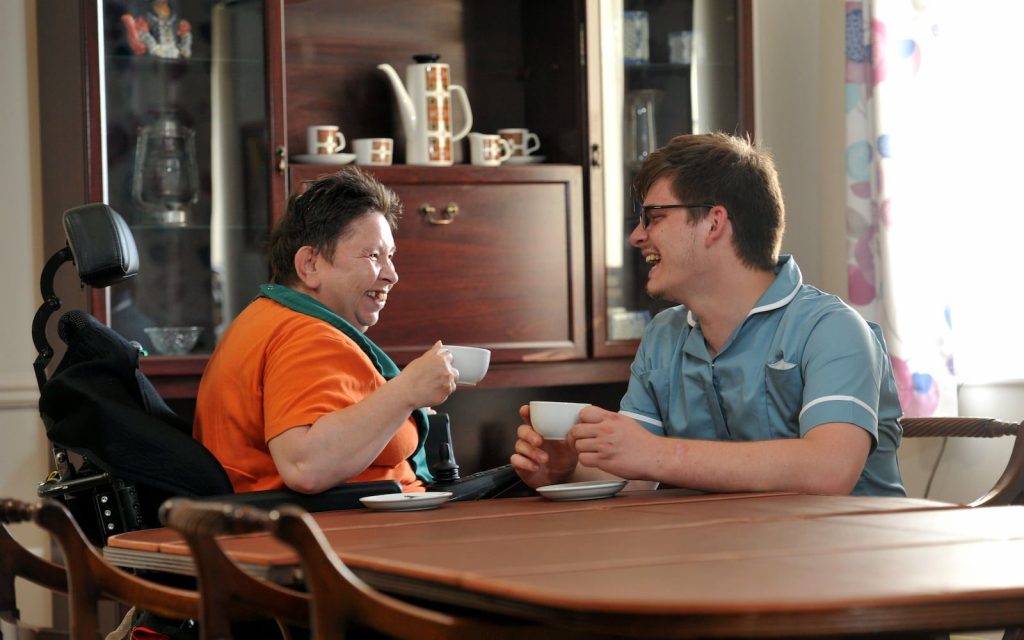Essex Care Home Ltd
Sensory Impairment

Sensory impairments refer to conditions that affect one or more of the senses: sight, hearing, smell, taste, touch, and spatial awareness. These impairments can significantly impact an individual’s daily life, affecting their ability to communicate, interact, and perform everyday tasks.
Common types of sensory impairments include:
- Visual Impairment: Partial or total loss of sight.
- Hearing Impairment: Partial or total loss of hearing.
- Dual Sensory Loss: Combined loss of sight and hearing, also known as deaf blindness.
Essex Care Home Ltd
Supported Living Service
We're Helping Everyone
See Our Facilities
At Essex Care Home Ltd, we are committed to providing specialised care and support for residents with sensory impairments. Our approach is designed to enhance the quality of life, promote independence, and ensure the safety and well-being of our residents.
Personalised Care Plans
Each resident with a sensory impairment receives a tailored care plan developed in collaboration with sensory impairment specialists, healthcare professionals, the residents themselves, and their families. These plans focus on addressing the specific needs and preferences of each individual.
Expert Staff
Our team includes working in partnership with multidisciplinary professionals trained in managing sensory impairments, ensuring that residents receive the highest level of care and support:
- Sensory Specialists: Experts in visual and hearing impairments.
- Communication Experts: Trained in various communication methods, including sign language and Braille.
Communication Support
Effective communication is essential for residents with sensory impairments:
- Sign Language and Braille: We work in collaboration with sign language and braille specialist to train and provide resources for residents and staff to facilitate communication.
- Assistive Technologies: Devices and software designed to aid communication and interaction.
Therapeutic and Recreational Activities
We offer a range of activities designed to engage and stimulate residents with sensory impairments:
- Sensory Rooms: stimulation tools to provide a calming and engaging environment are in our sensory room.
- Adaptive Sports and Recreation: Activities modified to accommodate sensory impairments, promoting physical health and social interaction in our large garden and also facilities in community that we access.
- Arts and Crafts: Tactile, resources are provided to encourage creativity and self-expression also smell aroma to help relax and enjoy .
Health and Wellness Services
Maintaining overall health is crucial for residents with sensory impairments:
- Regular Medical Check-Ups: Routine health assessments to monitor and address any additional health concerns.
- Specialist Care: Access to ophthalmologists, audiologists, and other relevant specialists through process of referral.
- Nutritional Support: Balanced meal plans tailored to meet the dietary needs of residents, considering any sensory-related eating difficulties.
Family Involvement and Support
We emphasise the importance of family involvement in the care process:
- Regular Communication: Keeping families informed about their loved one’s progress and involving them in care decisions.
- Visitation Programs: Encouraging regular family visits to maintain strong connections and support networks.
Community Integration
We strive to integrate residents into the community, promoting a sense of belonging and independence:
- Community Activities: Encouraging participation in local events and social gatherings.
- Volunteer Opportunities: Facilitating community service involvement to foster a sense of purpose and engagement.
Essex Care Home Ltd is dedicated to providing exceptional care for individuals with sensory impairments. Through personalised care plans, specialised support, adaptive environments, and community integration, we aim to enhance the quality of life for our residents, ensuring they receive the care and support needed to thrive in a safe and nurturing environment.
Frequently Asked Questions About Sensory Impairment Care
What is a sensory impairment?
Sensory impairment refers to a condition where one or more of the senses (sight, hearing, touch, taste, smell) is not functioning normally. Common types of sensory impairments include visual impairment, hearing impairment, and dual sensory loss (deaf-blindness).
What are the different types of sensory impairments?
The main types include:
- Visual Impairment: Includes partial sight and blindness.
- Hearing Impairment: Includes partial hearing loss and profound deafness.
- Dual Sensory Loss/Deaf-Blindness: A combination of both visual and hearing impairment.
- Other Sensory Impairments: May affect touch, taste, or smell.
What causes sensory impairments?
Causes can vary widely and include genetic conditions, infections, injuries, aging, chronic diseases (e.g., diabetes), and exposure to loud noises or toxic substances. Some impairments are congenital, while others are acquired later in life.
How are sensory impairments diagnosed?
Diagnosis typically involves a series of tests conducted by specialists:
- Visual Impairment: Eye exams by an optometrist or ophthalmologist, including visual acuity and field tests.
- Hearing Impairment: Hearing tests conducted by an audiologist, including audiometry and tympanometry.
- Other Sensory Impairments: Tests specific to the affected sense, conducted by relevant specialists.
What types of therapy are beneficial for people with sensory impairments?
Beneficial therapies include:
- Occupational Therapy: Helps with adapting to daily activities and using assistive devices.
- Physical Therapy: Assists with mobility and balance issues.
- Speech and Language Therapy: Supports communication for those with hearing impairments.
- Sensory Integration Therapy: Helps individuals, especially children, manage sensory processing issues.


